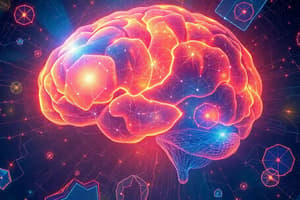Podcast
Questions and Answers
What aspects does psychology study?
What aspects does psychology study?
- Only observable behavior
- Only external stimuli and reactions
- The behavior of individuals and their mental processes (correct)
- The evolution of human thought processes
Which of the following best describes cognition?
Which of the following best describes cognition?
- An analytical process used in various fields of science
- Only the observable actions of individuals
- The private, internal workings of the mind (correct)
- An unstructured form of idea generation
Which need is not part of Maslow's hierarchy?
Which need is not part of Maslow's hierarchy?
- Self-actualization needs
- Physiological needs
- Spiritual needs (correct)
- Cognitive needs
What defines physiological needs according to Maslow?
What defines physiological needs according to Maslow?
What level in Maslow's hierarchy corresponds to belongingness needs?
What level in Maslow's hierarchy corresponds to belongingness needs?
Which concept best describes the need for interpersonal relationships?
Which concept best describes the need for interpersonal relationships?
What aspect does psychology analyze?
What aspect does psychology analyze?
Which of the following is an example of belongingness needs?
Which of the following is an example of belongingness needs?
What defines attention in psychology?
What defines attention in psychology?
Which statement best describes implicit memory?
Which statement best describes implicit memory?
What characterizes short-term memory?
What characterizes short-term memory?
How quickly is visual information processed in memory?
How quickly is visual information processed in memory?
What best describes cognition in psychological terms?
What best describes cognition in psychological terms?
Which of the following is NOT a characteristic of implicit memory?
Which of the following is NOT a characteristic of implicit memory?
Which statement accurately defines the scientific method in psychology?
Which statement accurately defines the scientific method in psychology?
What is a key feature of attention according to psychology?
What is a key feature of attention according to psychology?
Who is considered a founder of the psychodynamic perspective in psychology?
Who is considered a founder of the psychodynamic perspective in psychology?
What is the primary function of short-term memory?
What is the primary function of short-term memory?
Who are the renowned founders of the humanistic perspective?
Who are the renowned founders of the humanistic perspective?
Which example best illustrates implicit memory?
Which example best illustrates implicit memory?
Which of the following was not a founder of the behavioral perspective?
Which of the following was not a founder of the behavioral perspective?
Which option best defines sensation in the realm of psychology?
Which option best defines sensation in the realm of psychology?
What best describes perception in psychological terms?
What best describes perception in psychological terms?
Which founder is associated with the evolutionary perspective in psychology?
Which founder is associated with the evolutionary perspective in psychology?
Flashcards
Attention
Attention
The process of focusing on specific information while ignoring other stimuli.
Implicit memory
Implicit memory
A type of memory that influences our behavior without conscious awareness.
Short-term memory
Short-term memory
A temporary storage system that holds a limited amount of information for a short period of time.
Memory recall
Memory recall
Signup and view all the flashcards
Long-term memory
Long-term memory
Signup and view all the flashcards
Memory consolidation
Memory consolidation
Signup and view all the flashcards
Episodic memory
Episodic memory
Signup and view all the flashcards
Semantic memory
Semantic memory
Signup and view all the flashcards
Self-Actualization (Maslow)
Self-Actualization (Maslow)
Signup and view all the flashcards
Esteem Needs (Maslow)
Esteem Needs (Maslow)
Signup and view all the flashcards
Belongingness Needs (Maslow)
Belongingness Needs (Maslow)
Signup and view all the flashcards
Safety Needs (Maslow)
Safety Needs (Maslow)
Signup and view all the flashcards
Physiological Needs (Maslow)
Physiological Needs (Maslow)
Signup and view all the flashcards
What is Psychology?
What is Psychology?
Signup and view all the flashcards
What is Cognition?
What is Cognition?
Signup and view all the flashcards
What is the scientific method?
What is the scientific method?
Signup and view all the flashcards
Who are the founders of the psychodynamic perspective?
Who are the founders of the psychodynamic perspective?
Signup and view all the flashcards
Who are the founders of the humanistic perspective?
Who are the founders of the humanistic perspective?
Signup and view all the flashcards
Who are the founders of the behavioral perspective?
Who are the founders of the behavioral perspective?
Signup and view all the flashcards
Who are the founders of the evolutionary perspective?
Who are the founders of the evolutionary perspective?
Signup and view all the flashcards
What is sensation?
What is sensation?
Signup and view all the flashcards
What is perception?
What is perception?
Signup and view all the flashcards
Study Notes
Attention
- Attention is the mind's focus on one thing while ignoring others
- It involves withdrawing from competing stimuli
- Attention is not a static state but a dynamic process
Implicit Memory
- Implicit memory is a type of memory that affects behavior without conscious awareness
- It includes memories for learned skills, habits, and conditioning
- Implicit memories can influence actions without realizing it
Short-Term Memory
- Short-term memory stores recently encountered information
- It relies mostly on an acoustic code for storage
- Information is held for short durations, typically 20-30 seconds
Long-Term Memory
- Long-term memory stores information over extended periods, including lifetime memories
- It does not always require conscious effort for retrieval
- Examples include phone numbers, names, and addresses
Sensory Memory
- Sensory memory briefly stores sensory information
- It captures fleeting sensory impressions (visual, auditory, etc.)
- It holds information for a very short period before it's lost or transferred to short-term memory
Focused Attention
- Focused attention is the ability to attend to specific, discrete stimuli (visual, auditory, or tactile)
- It involves actively directing attention to a specific stimulus
- It's used in task focused situations where ignoring distractions is important
Alternating Attention
- Alternating attention is the ability to shift attention between different tasks or stimuli
- It involves switching between or focusing on multiple stimuli simultaneously
- Practicing tasks involving constant shifts in focus may improve alternating attention
Divided Attention
- Divided attention is the capacity to divide attention amongst different stimuli or tasks
- It requires dividing attention between various tasks
- Improving focus can be improved with practice
Selective Attention
- Selective attention is the ability to focus on a specific stimulus while filtering out irrelevant or distracting stimuli
- It's important for filtering out noises, distractions, or other stimuli not directly relating to the task
- It improves when trained and used regularly
Semantic Memory
- Semantic memory is a type of long-term memory
- It stores general knowledge, facts, and concepts
- Semantic memory is not tied to a specific experience
Episodic Memory
- Episodic memory stores personal experiences
- It's associated with specific times, places, and personal events
- Experiences are not typically forgotten, but can fade as time goes by
Procedural Memory
- Procedural memory stores information about how to perform tasks
- Includes learned skills, habits, and routines
- It allows for performing tasks automatically without conscious thought
Working Memory
- Working memory is a short-term memory system
- It allows for temporary storage and manipulation of information
- Important for completing tasks, encoding information, and reasoning
Types of Memory
- Episodic, semantic, working memory, procedural "body", implicit memory
Communication
- Communication is the process of conveyance of information or a message between two or more parties
- There are many types and forms including non-verbal
Temperament
- Choleric: Active, assertive, driving
- Sanguine: sociable, outgoing, positive
- Phlegmatic: calm, relaxed, steady
- Melancholic: sensitive, quiet, reflective
Psychological Approaches
- Psychodynamic: Emphasizes unconscious motives and early experiences
- Humanistic: Focuses on the potential for personal growth and self-actualization
- Behavioral: Focuses on observable behaviors and environmental factors that influence learning
- Cognitive: Focuses on mental processes like memory, perception, and thinking
- Evolutionary: Focuses on the evolutionary underpinnings of human psychological processes
Psychology Concepts
- Motivation: The drives underlying behavior
- Cognition: Mental processes involved in knowing, thought, and consciousness
Psychological Research
- Research methods: The strategies used to investigate psychological questions
- Important figures: Key individuals who contributed to the field of psychology
- Types of psychology: Various branches of psychological study
Sensory Processes
- Transduction: The process of converting physical energy into neural signals
- Sensation: The process of receiving and responding to stimuli
- Perception: The process of understanding and interpreting stimuli
Perception Types
- Top-down processing: uses background knowledge to understand stimuli
- Bottom-up processing: uses sensory experiences to perceive stimuli
Attention Terms
- Absolute threshold: Minimum stimulus strength that can be detected
- Just noticeable difference: Minimum difference that can be detected between similar stimuli
- Sensory adaptation: Diminished sensitivity to constant stimuli
Studying That Suits You
Use AI to generate personalized quizzes and flashcards to suit your learning preferences.




